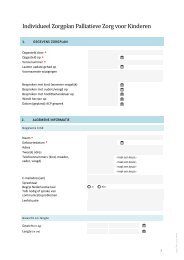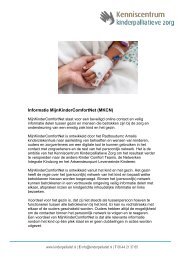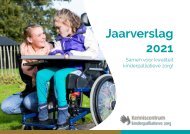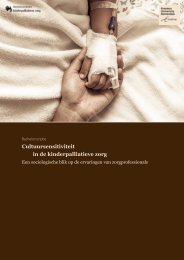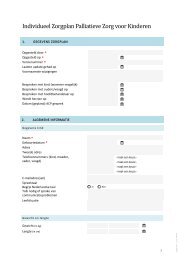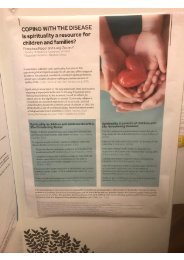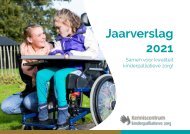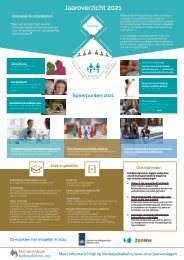EAPC Atlas of Palliative Care in Europe 2019
Conclusion: PC health policies developed in recent years have promoted vigorous development across Europe. Preliminary data on the integration of PC into different fields are encouraging though inequalities between countries and sub-regions persist. Further comparative analysis exploring factors leading to uneven progress may inform strategies to provide PC for all people in need. Per land is de stand van zaken van de (kinder)palliatieve zorg weergegeven.
Conclusion: PC health policies developed in recent years have promoted vigorous development across Europe. Preliminary data on the integration of PC into different fields are encouraging though inequalities between countries and sub-regions persist. Further comparative analysis exploring factors leading to uneven progress may inform strategies to provide PC for all people in need.
Per land is de stand van zaken van de (kinder)palliatieve zorg weergegeven.
You also want an ePaper? Increase the reach of your titles
YUMPU automatically turns print PDFs into web optimized ePapers that Google loves.
Chapter 3. Integration <strong>of</strong> <strong>Palliative</strong> <strong>Care</strong><br />
<strong>in</strong> national health systems <strong>in</strong> <strong>Europe</strong><br />
EUROPEAN CONTEXT<br />
B<br />
TECHNICAL DATA ON THE <strong>2019</strong><br />
<strong>EAPC</strong> SURVEY ON PALLIATIVE CARE<br />
IN NATIONAL HEALTH SYSTEMS<br />
IN EUROPE<br />
Population: 54 countries <strong>of</strong> the <strong>Europe</strong> WHO region<br />
and Lichtenste<strong>in</strong>.<br />
Survey 1 Details<br />
Areas explored: 8 ma<strong>in</strong> health <strong>in</strong>dicators on Public<br />
Health (Arias-Casais N et al, <strong>2019</strong>): health policies,<br />
legislation and norms, health management,<br />
fund<strong>in</strong>g.<br />
Questionnaire: onl<strong>in</strong>e survey, 72 questions,<br />
answered <strong>in</strong> (average): 80 m<strong>in</strong>utes .<br />
Participants: 92 national Key persons for palliative<br />
care development, nom<strong>in</strong>ated from National Associations<br />
or identified by publications and/or previous<br />
publications.<br />
Coverage: 51/54 countries (94%): with two respondents<br />
29/51 countries (57%), with one respondent<br />
20/51 (39%), other sources 2/51 (4%).<br />
Survey 2 Details<br />
Areas explored:<br />
—3 <strong>in</strong>dicators on time <strong>of</strong> stay <strong>of</strong> patients <strong>in</strong> specialised<br />
PC, database on PC provision, National program<br />
on Chronic diseases (specially developed for<br />
this survey by authors).<br />
—8 ma<strong>in</strong> <strong>in</strong>dicators on public health (Arias-Casais<br />
N et al, <strong>2019</strong>).<br />
Questionnaire: onl<strong>in</strong>e survey, 13 questions, time<br />
answered <strong>in</strong> (average) 32 m<strong>in</strong>utes.<br />
Participants: 29 national experts <strong>in</strong> <strong>Palliative</strong> <strong>Care</strong><br />
Public Health issues.<br />
Pr<strong>of</strong>ile <strong>of</strong> experts (affiliation): 15 University, 4<br />
PC Service, 3 National Association, 2 M<strong>in</strong>ister <strong>of</strong><br />
Health, 2 Open Society and 1 Primary <strong>Care</strong>.<br />
Coverage: 26/54 countries (48%): with one<br />
respondent 23/26 (88%) countries, with 2<br />
respondent 3/26 (11%).<br />
Data collection: 12/2018 to 3/<strong>2019</strong> (4 months).<br />
Project Management: ATLANTES Research Group,<br />
Institute for Culture and Society, University <strong>of</strong> Navarra,<br />
Pamplona (Navarra), Spa<strong>in</strong>.<br />
Scientific Advice: Luc Deliens (Belgium), Xavier<br />
Gómez Batiste (Spa<strong>in</strong>).<br />
Promotor: <strong>Europe</strong>an Association for <strong>Palliative</strong><br />
<strong>Care</strong> (<strong>EAPC</strong>).<br />
“PALLIATIVE <strong>Care</strong> for all<br />
WHO need it!”.<br />
In this simple way the <strong>Europe</strong>an<br />
Association for <strong>Palliative</strong> <strong>Care</strong><br />
(<strong>EAPC</strong>) stated the heart <strong>of</strong> its<br />
vision and mission years ago. In<br />
2007 this voice was re<strong>in</strong>forced when<br />
the World Health Assembly adopted<br />
the 67·19 resolution (1) on the need<br />
<strong>of</strong> strengthen<strong>in</strong>g and improv<strong>in</strong>g health<br />
coverage by <strong>in</strong>tegrat<strong>in</strong>g PC <strong>in</strong>to national<br />
health systems. In 2018, The Lancet<br />
Commission on PC claimed that<br />
35·5 million people experienced serious<br />
health-related suffer<strong>in</strong>g due to<br />
life-threaten<strong>in</strong>g and life-limit<strong>in</strong>g conditions<br />
(2). Recently, the Declaration<br />
<strong>of</strong> Astana’s Global Conference on Primary<br />
Health <strong>Care</strong> stepped towards the<br />
decisive <strong>in</strong>clusion <strong>of</strong> PC as an essential<br />
service to achieve universal health coverage<br />
by 2030 (3).<br />
This chapter presents an overview <strong>of</strong><br />
the <strong>in</strong>tegration <strong>of</strong> PC <strong>in</strong>to the National<br />
Health Systems across <strong>Europe</strong> by look<strong>in</strong>g<br />
at the countries´ regulatory framework,<br />
health strategies and application<br />
<strong>of</strong> health policies <strong>in</strong> practice.<br />
The right for PC<br />
and the legislation<br />
The majority <strong>of</strong> <strong>Europe</strong>an countries<br />
(76%) have adapted their General<br />
Health Laws and <strong>in</strong>cluded PC as a mandatory<br />
service, as a right <strong>of</strong> the patient,<br />
or even as a human right. PC is <strong>in</strong>cluded<br />
<strong>in</strong> the list <strong>of</strong> primary care health services<br />
<strong>in</strong> 36 countries (71%). Greece<br />
guarantees PC <strong>in</strong> the first Article <strong>of</strong> the<br />
Primary Health <strong>Care</strong> Law whereas other<br />
countries cover PC <strong>in</strong> the general<br />
legislation. In Austria, PC is def<strong>in</strong>ed <strong>in</strong><br />
the latest legislation as a medical task,<br />
<strong>in</strong> some German states GPs tra<strong>in</strong>ed <strong>in</strong><br />
basic PC (40 hrs) are entitled to be paid<br />
Carlos Centeno, Luc Deliens, Xavier Gómez-Batiste.<br />
for PC services. and <strong>in</strong> other countries<br />
like the Netherlands, general health<br />
care pr<strong>of</strong>essionals are obliged to provide<br />
PC services at home. Eight countries<br />
have a dedicated Law to PC.<br />
National Plans or Strategies<br />
National PC Plans are available <strong>in</strong> almost<br />
all Western <strong>Europe</strong>an countries except<br />
for smaller states or the United K<strong>in</strong>gdom<br />
and Belgium where a different way to<br />
deal with health policy exists. In politically<br />
decentralised countries such as<br />
Spa<strong>in</strong>, Switzerland or the Czech Republic,<br />
regional authorities promote rather<br />
regional PC strategies. Poland was one<br />
<strong>of</strong> the first Eastern <strong>Europe</strong>an countries<br />
to have a national PC programme and<br />
<strong>in</strong> Russia a special sub-programme on<br />
PC development <strong>in</strong>cluded <strong>in</strong> the State<br />
Health Programme “Health <strong>Care</strong> development<br />
<strong>in</strong> Russia” has recently been<br />
developed. Other countries like Germany<br />
do not have a National Plan or Strategy<br />
but an equivalent Law on Hospice and<br />
<strong>Palliative</strong> <strong>Care</strong> (December 2015) that is<br />
be<strong>in</strong>g carefully implemented.<br />
The management<br />
<strong>of</strong> policies <strong>in</strong> practice<br />
The existence <strong>of</strong> a person <strong>in</strong> the Department<br />
<strong>of</strong> Health responsible for PC policies<br />
has been considered the most relevant<br />
policy <strong>in</strong>dicator by the experts <strong>of</strong><br />
this <strong>EAPC</strong> survey. Interest<strong>in</strong>gly, 35/51<br />
countries (83% <strong>in</strong> Western <strong>Europe</strong> and<br />
56% <strong>in</strong> Central and Eastern <strong>Europe</strong>)<br />
report a designated person with this role.<br />
Hav<strong>in</strong>g data is crucial to apply appropriate<br />
policies and some countries like Italy,<br />
Georgia, Hungary, Sweden, Denmark<br />
and Belgium have started register<strong>in</strong>g PC<br />
provision outcomes <strong>in</strong> national databases.<br />
(De Schreye R, 2017).<br />
<strong>EAPC</strong> <strong>Atlas</strong> <strong>of</strong> <strong>Palliative</strong> <strong>Care</strong> <strong>in</strong> <strong>Europe</strong><br />
57




